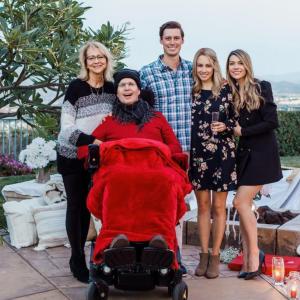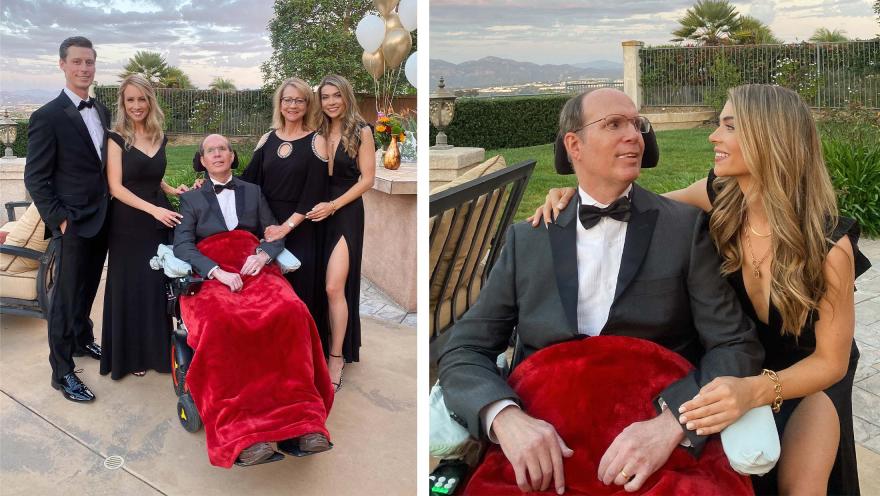Coping with the loss of something or someone you love is certainly one of life’s biggest challenges, and there’s no right or wrong way to grieve that loss. However, through understanding grief, allowing yourself time and space, and utilizing tools and resources, you can work through the process in a healthy and productive manner that’s right for you.
“I think that grief becomes less painful over a period of time, but I also do believe that it is always something that is close to our heart,” says JoCarolyn Chambers, care services manager at The ALS Association. “How do you get help for grieving? There's a lot of different options, resources, bereavement groups, spiritual leaders, reading materials, again, that trusted friend, your confidant. Everyone deals with it differently.”
Connecting ALS recently sat down with Sarah Trott to learn more about her experience as an ALS caregiver for her father who recently lost his battle with ALS, and better understand the challenges with grief she has experienced and the steps she is taking to overcome her terrible loss.
The transcript below has been edited for brevity and clarity.

When you were last on Connecting ALS, you shared your story as a caregiver for your father, and that was just a few months ago. Sadly, you lost your father in October. As our listeners are all too well aware with ALS, a lot can change in just a few short months.
Yeah. The last time I was on the podcast was April, and so much happened from April to October. People familiar with ALS know how difficult it can be, the anticipatory grief, what to do in the moments when the end is nearing and it's happening, and then what do you do in the hours, days, weeks, months after that has happened? It's been an up-and-down journey for me and my family, but I'm learning to understand grief and navigate these next chapters. It's been an up-and-down process, for sure.
Sarah, you mentioned the how's. What are the how’s? What are some of the ways in those days, weeks and months, where did you turn? What did you do to navigate your own grief journey?
For me, what worked best was to not isolate myself. Fortunately, in the weeks and months before my dad's passing, I had created a caregiver community Facebook group, a support group, and also started virtual Zoom weekly meetups with other young female caregivers. I used those resources and all of those tools in my toolkit, all of the people that I leaned on before my dad's passing and after that time to explain how I was feeling and to share how I was feeling, to cry, to vent, and to receive that support. Fortunately, I had those things in place.
Also, I found it really helpful to be with other people impacted by ALS. Just a couple weeks after my dad passed, I went with Hope Loves Company to a retreat in the Santa Cruz Mountains in California outside of San Francisco, and was in nature, and was a camp counselor for young kids who are impacted by ALS. I found that to be a spiritual moment, I guess, to feel really in tune with my dad, and to sit with the grief, and to feel the grief, to cry, to laugh, to share experiences, share advice with other people impacted by ALS.
In that time after his passing, it was so fresh, but I really felt in touch with my dad because we would, when I was younger, I would go on father-daughter camping trips with him. We would be in the mountains together. We would be camping or in cabins. Just being in that environment was a really good way to feel that immense loss, but to also honor him and feel hope in the future of moving forward and making the grief not feel so enormous, to make it feel like it's part of me, but I can also manage it.
How do the conversations that you've had around grief in the past few months, how do you balance the focus on this idea that we have of grief as something to get through as opposed to is grief thing that it stays with us and it can lessen over time, it can ebb and flow? What's your perspective on that several months into this process?
I'm realizing grief is not a one-size-fits-all thing. I mean, everybody has a different way of coping and managing with grief. Sometimes it's easier to just remove everything that reminds you of the person that you were caring for or to block that out and I've found quite the opposite. To think about everything that I've been through and to really understand the magnitude of it and to give myself grace and time to heal. For me, it helps to be around the things that remind me of my dad and it can be painful, but it's a way to recognize that this momentous life event happened, that my dad passed away, and that to cry randomly is okay. To not cry is okay.
It does get easier with time. I feel that's something we've heard over and over. “Oh, just give it time, give it time.” But it is true. Time does help heal. To be around people who are supportive, to listen to your body, and to listen to your emotions of if you're just feeling like, "Hey, I need to spend some extra time in bed today, and drink some warm tea, and be cozy, and lazy," that's okay. And other days it's going to be easier. Other days, I'm able to talk about my experience about my dad, to be really strong and to be really passionate about all of these things.
To learn more about the emotional impacts of ALS, visit our website HERE.
Special thanks to Sarah Trott for sharing her thoughts and personal journey as an ALS caregiver. To continue to follow stories about people living with ALS in the community and learn more about the disease, follow our blog at als.org/blog.
Listen to the entire podcast episode, "Handling Grief and Loss...", on Connecting ALS or wherever you listen to your podcasts.


Comments
I lost my wife Dec 5 2019, one day before my birthday. I don't celebrate that anymore. I was her only caretaker, she was humiliated by the disease. I knew she would of been uncomfortable with someone else caring for her. But, I still have guilty feelings that I just didn't do enough.
So sorry for your loss, Charlie. My sympathies.
Dear Charlie,
Sorry for your lost and sharing. I too feel that it’s not enough care. My father and I have a few helpers to give us rest and I still don’t think it’s enough care. I don’t think there will be enough help as my mothers condition worsens. I’m hoping to have the conversation with my mom regarding what to do when she’s back from the hospital, but you have done enough. Being present for your wife as you watched her battle the disease is enough. Everything you have sacrificed for her care is enough.
I too lost my dear wife of 47 years to ALS on 12/25/20. Toni was a nurse and I was her only caretaker. She too would not have allowed another. She also was insistent on staying in our home, which we accomplished.
We managed Toni’s illness very well for 4 years until the very end. I also still feel that I didn’t do enough and have guilt feelings.
Ed Kep
My sweet lovely Kenda passed away in September 2020, having just been formally diagnosed five months to the day prior. We had been together 44+ years.
In addition to my sessions with a grief counselor since 12/20, I have found great solace and reflection from a book by Martha W. Hickman, "Healing After Loss." I cannot recommend this work strongly enough.
"Grief is something one must go through, as you cannot go around it."
Bless you all,
Mark N Lundgren
ALS is a very hard disease to deal with in that the diagnosis is an immediate death sentence to the person who is diagnosed. There is nothing that can be done to change that. And nothing on the horizon to change the situation. 153 years with no progress toward a cure or slowing of the disease.
I am the full time caregiver to my wife of 34 years who has had the disease for 9 years. She has been bedridden for the past three and a half years now. I am tired but keep working at giving her the best care that I can. Hope was thrown out the window the day she was diagnosed. I cannot sugar coat the facts and if you don’t want to hear then don’t listen.
Join the conversation. Please comment below.